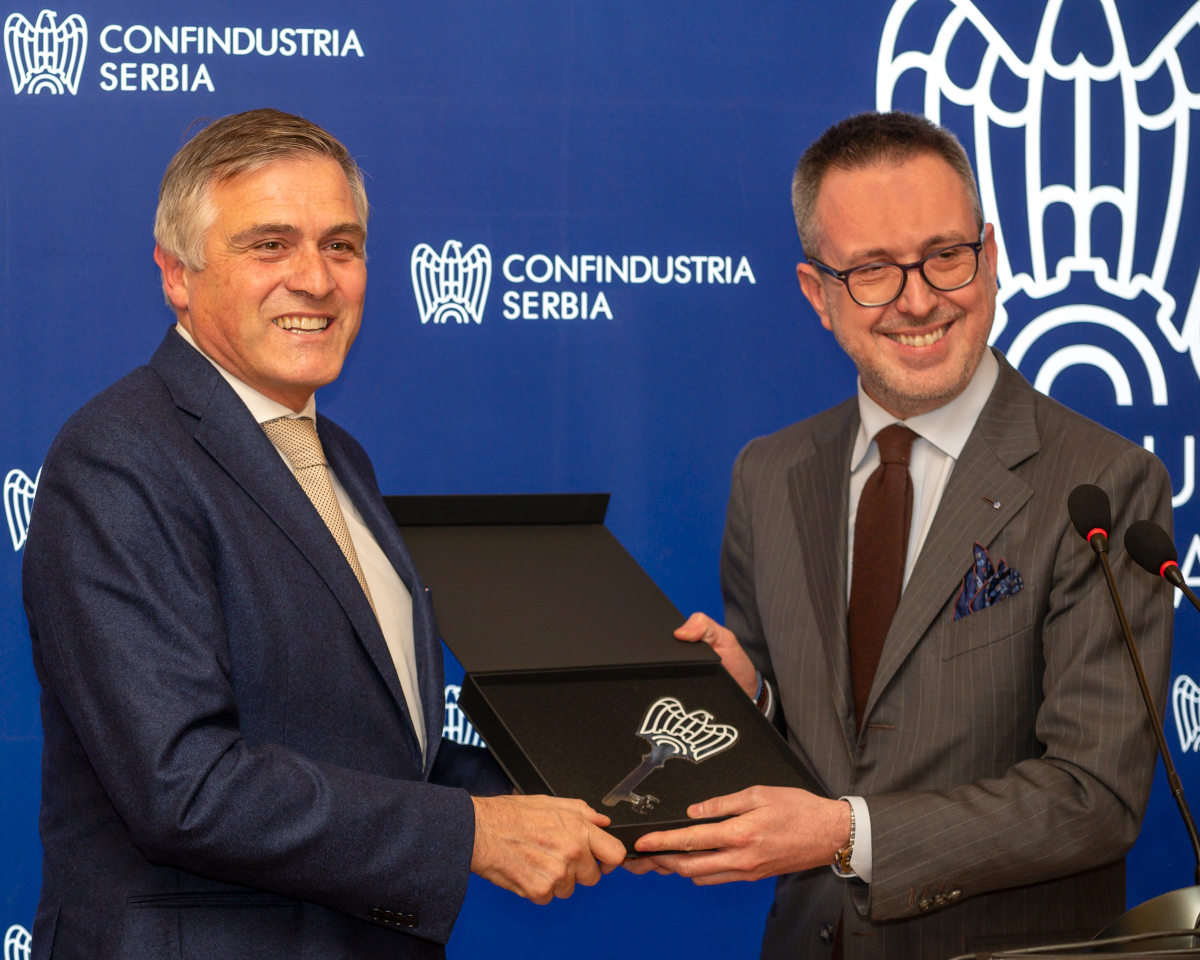I presented myself with an ambitious but fully achievable program between now and 2022

The General Assembly held on December, the members of Confindustria Serbia unanimously appointed Patrizio Dei Tos as the new president of this business association for the term 2019 – 2022.
He talks about further plans in an interview. You have assumed the position of President of Confindustria Serbia. What is your plan?
— I presented myself with an ambitious but fully achievable program between now and 2022. First of all I will try to strengthen our territorial representation, which I would like to achieve by increasing our activities on all Serbian territory and organizing monthly visits to our member companies. Also, when it comes to the level of representation, one of the priorities is the creation of increasingly concrete and broad relationships between the worlds of entrepreneurship, with the interaction between Confindustria Serbia, Confindustria Italy, Confindustria Eastern Europe and the Italian regional representative offices of Confindustria.
This will send a strong message to new potential investors, who will be able to expect a flexible and agile network of support for their business. I also believe that in this historical moment it is of fundamental importance to maintain and improve Confindustria’s direct and exclusive contacts with the customs administration, with the tax agency and with all the state bodies so as to facilitate the work of our companies, especially from a bureaucratic point of view.
Additionally, other strategic points for quickly and effectively achieving the goals that we set ourselves are “networking” and training. Last but certainly not least – the relationship of collaboration with the institutions and with the competent ministries, especially for the protection of the workers of our companies, for the tax protection of the associated companies and for their development, is of extreme importance. Our idea is to strengthen as much as possible our promotion of public-private partnerships.
What results do you plan to achieve with regard to the expansion and quality of the internationalization of Italian companies in Serbia?
— The goal is to help companies grow by making a proactive network. Italian companies in Serbia are already pretty strong, nevertheless I believe that together we have the opportunity to grow further and to be not only a virtual but a concrete bridge of union between Italy and Serbia.
Confindustria Serbia is here to be a concrete support in collaborations established with businesses and the local economy, to work synergistically in the development and implementation of new ideas and new projects.
How can the Italian presence in the country be even more cohesive with the view of achieving greater overall results?
— I believe it is necessary to proactively maintain an open dialogue with all the stakeholders in order to ensure an adequate training of the local workforce from the perspective of empowerment and maturity. This is crucial to ensure the presence of Italian companies in the country over time. Our efforts in terms of continuous education and training, will continue and develop in the next three years: we will screen the needs of our member companies, and try to foster their collaboration in terms of workforce training and education. The State has been spending a lot of effort and attention, but as I said some challenges can only be met with strong public private partnerships.
Are you satisfied the conditions for doing business in Serbia?
— Overall yes, although improvement is always possible. The greatest satisfaction we have today is knowing that those who do business here in Serbia can count on the openness and respect from local administrations. This is of outmost importance for Italian investors who came to Serbia to stay. Having an open and proactive collaboration with the administrations of the cities where our investor found a chance for their business, is an aspect that somehow guarantees their stay here. The further development of infrastructure, in which the government is heavily investing, will also most certainly help in attracting new companies and businesses. Confindustria Serbia has played an important role in promoting digital economy in the region through thematic conferences and other activities.
How important is this topic for the business of each company?
— Digitization is the future and while being a challenge it creates a fertile ground to build on. Confindustria Serbia has been and will always be at the forefront in organizing and promoting all the latest trends in the digital sphere, considering them strategic for growth on the markets, for the development of brands and for maintaining the control of companies with an almost zero margin of errors. As I said already, this is another issue that requires a public private cooperation: the digital transformation we are living nowadays cannot offer its best to business, if the public sector isn’t aware of the necessary changes and the potential challenges. We will continue working on this, as our companies- especially those operating in two or more countrieshave an internal imperative when adaptation and group modus operanda are concerned. Technological advancement is inevitable, Confindustria Serbia wants to be there to actively support companies in their effort.

Until now, Serbia has often been presented only as a country with low wages and low business costs and where one would want to relocate production with low added value, perhaps by closing their factories in Italy. How would you present Serbia to a company from the point of assessing the feasibility of that company’s future investment?
— I don’t share this vision of Serbia. Of course companies come to Serbia for different reasons: some look for opportunities here in terms of strategic investments, others to develop R&D projects, and others to find a new hope for their business. This is typical for any foreign investor. These can be painful and forced choices, guided by globalization: the world is getting faster, closer and business propensity to adapt has to keep the pace.
And it is therefore only thanks to the commitment of my fellow entrepreneurs and their collaborators – who often put their families at stake to manage companies abroad – that we continue to have healthy industries and markets under control. What I would say to my fellow entrepreneurs about Serbia? I would not concentrate on the price of the workforce, but on its quality. I would underline the trade agreements Serbia has in place with third countries, as well as the logistical aspects that place Serbia in the center of the wider region. I would mention a responsive public administration and proactive educational institutions. Most of all I believe that our positive experience, is the greatest promotion card Serbia can play. In these terms Confindustria and our member companies will continue promoting Serbia in all the activities we have planned in Italy: word of mouth has always a great effect in the business community.
What importance does the fact that Serbia is currently in the process of joining the EU have for Italian companies?
— This is a complex matter to say the least. Europe at this historic moment is not without its problems and if Serbia today becomes a part of the European Union it would also be directly involved in these critical issues. On the other hand, the experience of the Member States would undoubtedly constitute a driving force in the growth of the country. As the recent visits of the Italian prime minister and other institutional representatives demonstrates, Italy is Serbia’s partner in its journey to the EU: our historical friendship made our bilateral bond strong, and Italy will advocate for Serbia at the European table.
What roles can employers’ organizations play in the development of the region?
— The organization of work in Serbia is evolving rapidly and for this reason the employer organizations have an important role, especially when they are called into question for the drafting of the laws that regulate work and the relationship with workers. I have already met the Serbia association of Employers with which I’d like to put in place concrete actions and steps to support our investors. I also believe it is important to open a decision-making table within the Ministry of Labor, as from the comparison between different experiences, solutions can arise.